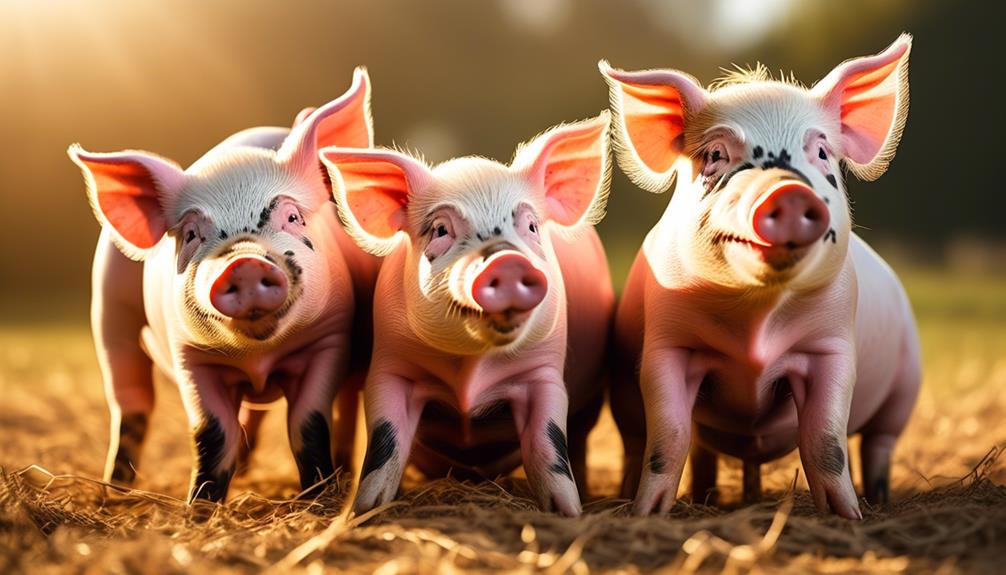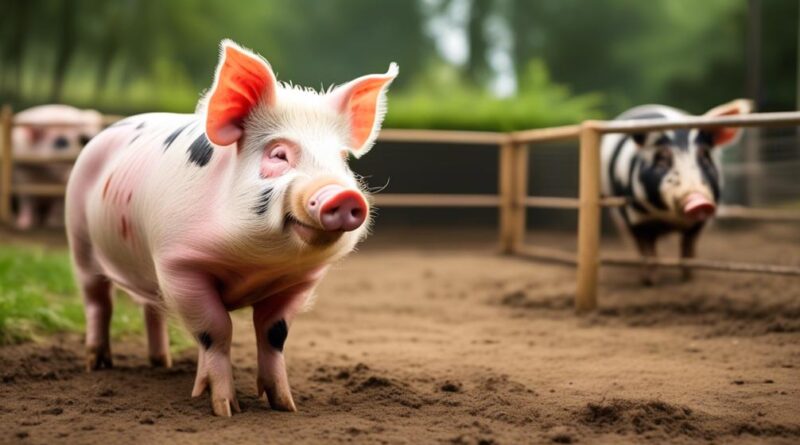Why Choose Easy-to-Raise Pig Breeds?
If you're considering raising pigs, you might be interested to know that approximately 97% of all pigs raised in the United States belong to just five breeds.
But why should you consider choosing easy-to-raise pig breeds for your farm?
Well, not only do these breeds require less intensive care and management, but they also offer a range of other benefits that can make pig farming a rewarding and profitable venture.
Cost-Effective Breeds
When looking for cost-effective pig breeds, consider the Hampshire and Duroc breeds for their efficient feed conversion and relatively low maintenance requirements. These breeds offer economic advantages due to their ability to thrive on affordable options for feed and their efficient utilization of resources.
Hampshire and Duroc pigs are known for their excellent feed-to-meat conversion rates, making them ideal choices for those seeking to raise pigs for meat production while keeping costs in check.
The Hampshire breed, in particular, is recognized for its feed efficiency, meaning it can convert feed into meat with minimal waste. This makes Hampshire pigs an economically advantageous option for those looking to maximize their resources.
Likewise, Duroc pigs are valued for their ability to efficiently convert feed into high-quality meat, providing another affordable choice for pig farmers.
Low-Maintenance Pigs
Consider low-maintenance pig breeds such as the Kunekune and the Gloucestershire Old Spot for their ease of care and minimal upkeep requirements. These breeds are ideal for those seeking pigs that require minimal grooming and are self-sufficient in their care.
The Kunekune, with its small size and friendly disposition, requires minimal grooming due to its short and often curly coat. Their hardy nature and ability to thrive on pasture make them easy to care for, requiring less attention compared to other breeds.
Similarly, the Gloucestershire Old Spot is known for its self-sufficient care. Their docile temperament and propensity to forage for food make them low-maintenance pigs, as they can graze and find sustenance with minimal intervention.
When considering low-maintenance pig breeds, it's important to note that minimal grooming and self-sufficient care not only reduce the workload for the owner but also contribute to the overall well-being of the pigs. These traits make them suitable for individuals who may have limited time to dedicate to extensive grooming and care routines. Additionally, their ability to thrive with less human intervention aligns with sustainable and cost-effective pig farming practices.
Beginner-Friendly Options
If you're new to raising pigs, beginner-friendly options such as the American Guinea Hog and the Tamworth breed are worth considering for their manageable care and adaptable nature. These breeds are known for their docile temperament, making them easier to handle and train, especially for beginners. When it comes to training methods, both the American Guinea Hog and Tamworth are quick learners, responding well to positive reinforcement techniques such as clicker training and treats. This makes the training process less daunting for those new to pig farming.
In terms of housing requirements, the American Guinea Hog and Tamworth are well-suited for small farms or homesteads. They're known for their ability to thrive in various environments, whether it be pasture-based systems or more confined spaces. When setting up their living quarters, providing ample space for them to roam and root, as well as sturdy fencing, is essential. Additionally, ensuring that their shelter offers protection from the elements is crucial for their well-being. Both breeds are adaptable to different climates, but it's important to provide adequate shade and bedding to keep them comfortable.
Small-Scale Farming Choices
Pigs suitable for small-scale farming can offer a rewarding experience. Building on the adaptability and ease of care of beginner-friendly options, breeds like KuneKune and Pot-bellied pigs stand out for their manageable size and low maintenance requirements.
When considering small-scale farming choices, sustainable practices and breeding choices play a crucial role. KuneKune and Pot-bellied pigs are well-suited for small-scale farming due to their ability to thrive on pasture and forage, contributing to sustainable agricultural practices. These breeds have the advantage of being efficient foragers, helping to minimize the need for intensive feeding and reducing the environmental impact of pig farming.
Market demand and breed selection are also key aspects to consider when making small-scale farming choices. KuneKune and Pot-bellied pigs are increasingly sought after by consumers who prioritize high-quality, ethically-raised pork products. Their smaller size and unique characteristics make them appealing to niche markets, providing small-scale farmers with an opportunity to meet specific consumer demands and potentially command premium prices for their products.
Efficient Feed Conversion
To maximize efficiency in feed conversion, focus on selecting pig breeds known for their ability to convert feed into lean muscle effectively. This selection won't only improve feed efficiency but also bring economic benefits to your pig farming endeavors.
When considering efficient feed conversion, it's crucial to understand the impact of livestock management and sustainability practices. Here's how you can achieve efficient feed conversion:
- Selecting the Right Breeds
Choose pig breeds renowned for their efficient feed conversion. Breeds such as the Duroc, Hampshire, and Chester White are known for their ability to efficiently convert feed into lean muscle. These breeds are ideal for small-scale pig farming, as they offer excellent feed efficiency and faster growth rates.
- Implementing Sustainable Practices
Adopt sustainable farming practices that optimize feed utilization. This includes providing a balanced diet that meets the nutritional needs of the pigs while minimizing waste. Additionally, consider incorporating by-products from other farm operations, such as surplus fruits and vegetables, to supplement the pigs' diet. This not only reduces food waste but also contributes to sustainable food production.
Hardy and Resilient Breeds
When considering hardy and resilient breeds, prioritizing efficient feed conversion can lead to selecting pig breeds known for their ability to thrive in various environmental conditions. Hardy pig breeds are inherently equipped to withstand a range of environmental challenges, making them well-suited for diverse farming settings. These breeds have developed natural resistance to parasites, reducing the need for extensive chemical intervention and minimizing the risk of health issues associated with parasitic infestations.
By choosing hardy and resilient breeds, you can minimize the labor and costs associated with parasite control while promoting a more sustainable and eco-friendly farming approach.
Additionally, hardy and resilient pig breeds are adaptable to various environments, making them suitable for different climate and terrain conditions. Whether your farm is located in a hot and humid region or a colder, more rugged area, these breeds can thrive and maintain good health. Their ability to adapt to different environments reduces the need for costly climate control measures, ultimately contributing to more cost-effective pig farming operations.
Gentle Temperament Pigs

With their docile nature and calm demeanor, gentle temperament pig breeds provide an ideal choice for farmers seeking a low-stress rearing experience. These pigs are known for their friendly and amiable disposition, making them easier to handle and work with on the farm. When considering gentle temperament pig breeds, it's crucial to understand the significance of training techniques and health considerations.
- Training Techniques
- Positive Reinforcement: Gentle pigs respond well to positive reinforcement during training. Using rewards such as treats or praise can help in teaching them commands and behaviors.
- Consistent Handling: Regular and gentle handling from a young age can help in developing trust and ease of management. This helps in preventing skittish behavior and reduces stress for both the pigs and the farmers.
- Health Considerations
- Stress Management: Gentle pigs are more susceptible to stress-related health issues. It's important to provide a calm and comfortable environment to prevent stress and its adverse effects on their well-being.
- Regular Veterinary Check-ups: Due to their gentle nature, they may not exhibit signs of illness as prominently as more high-strung breeds. Regular veterinary check-ups are essential to monitor their health and catch any potential issues early.
Quick Growth and Maturity
Achieving quick growth and maturity in your pig herd requires careful selection of breeds and a well-balanced feeding regimen. When it comes to fast development and early maturity, choosing easy-to-raise pig breeds can make a significant difference in the overall efficiency and profitability of your operation.
Selecting pig breeds known for their quick growth and early maturity can help you achieve your desired results. Breeds like the Duroc, Hampshire, and Yorkshire are known for their rapid growth rates, reaching market weight in a relatively short period. These breeds are genetically predisposed to efficiently convert feed into muscle, allowing for faster weight gain and earlier maturity.
In addition to breed selection, providing a well-balanced feeding regimen is crucial for promoting quick growth and early maturity in your pigs. High-quality, nutritionally balanced feed tailored to the specific needs of growing pigs is essential. It's important to work with a knowledgeable nutritionist to develop a feeding program that meets the nutritional requirements of your chosen pig breeds, promoting rapid growth and efficient development.
Frequently Asked Questions
Are There Any Pig Breeds That Are Particularly Suited for Urban Farming or Backyard Raising?
Looking to start urban farming or raise pigs in a backyard? Consider easy-to-manage breeds like KuneKune or Pot-bellied pigs. They're great for small spaces and beginner-friendly animal husbandry. Their docile nature makes them ideal for urban environments.
Can Easy-To-Raise Pig Breeds Be Suitable for Individuals With Limited Experience in Animal Husbandry?
Easy-to-raise pig breeds can be suitable for you if you have limited experience in animal husbandry. Basic care and training needs are manageable, making these breeds a good choice for beginners.
What Are the Best Pig Breeds for Those Who Are Interested in Organic or Pasture-Based Farming Methods?
For organic farming and pasture-based methods, consider heritage breeds like Tamworth, Gloucestershire Old Spots, and Large Blacks. They thrive outdoors and produce high-quality meat. Urban and backyard pig raising can benefit from Kunekune and American Guinea Hogs.
Are There Any Unique Challenges or Considerations for Raising Easy-To-Raise Pig Breeds in a Cold Climate?
In a cold climate, raising easy-to-raise pig breeds presents unique challenges. You'll need to ensure proper insulation, access to water, and protection from harsh weather. Consider these factors when raising pigs in a colder environment.
Can Easy-To-Raise Pig Breeds Be Suitable for Individuals Who Are Interested in Using Pigs for Non-Traditional Purposes, Such as Therapy Animals or Educational Programs?
Easy-to-raise pig breeds can be suitable for individuals interested in using pigs for non-traditional purposes, such as therapy animals or educational programs. They offer a manageable and friendly option for these specialized roles.
Conclusion
So, if you're looking to start pig farming, easy-to-raise pig breeds are the way to go. They're cost-effective, low-maintenance, and beginner-friendly, making them perfect for small-scale farming.
With efficient feed conversion and quick growth, these hardy and resilient pigs are a great choice for any farmer. Their gentle temperament and quick maturity make them a valuable addition to any farm.
So, why choose anything else? Start with easy-to-raise pig breeds and watch your farm thrive.
